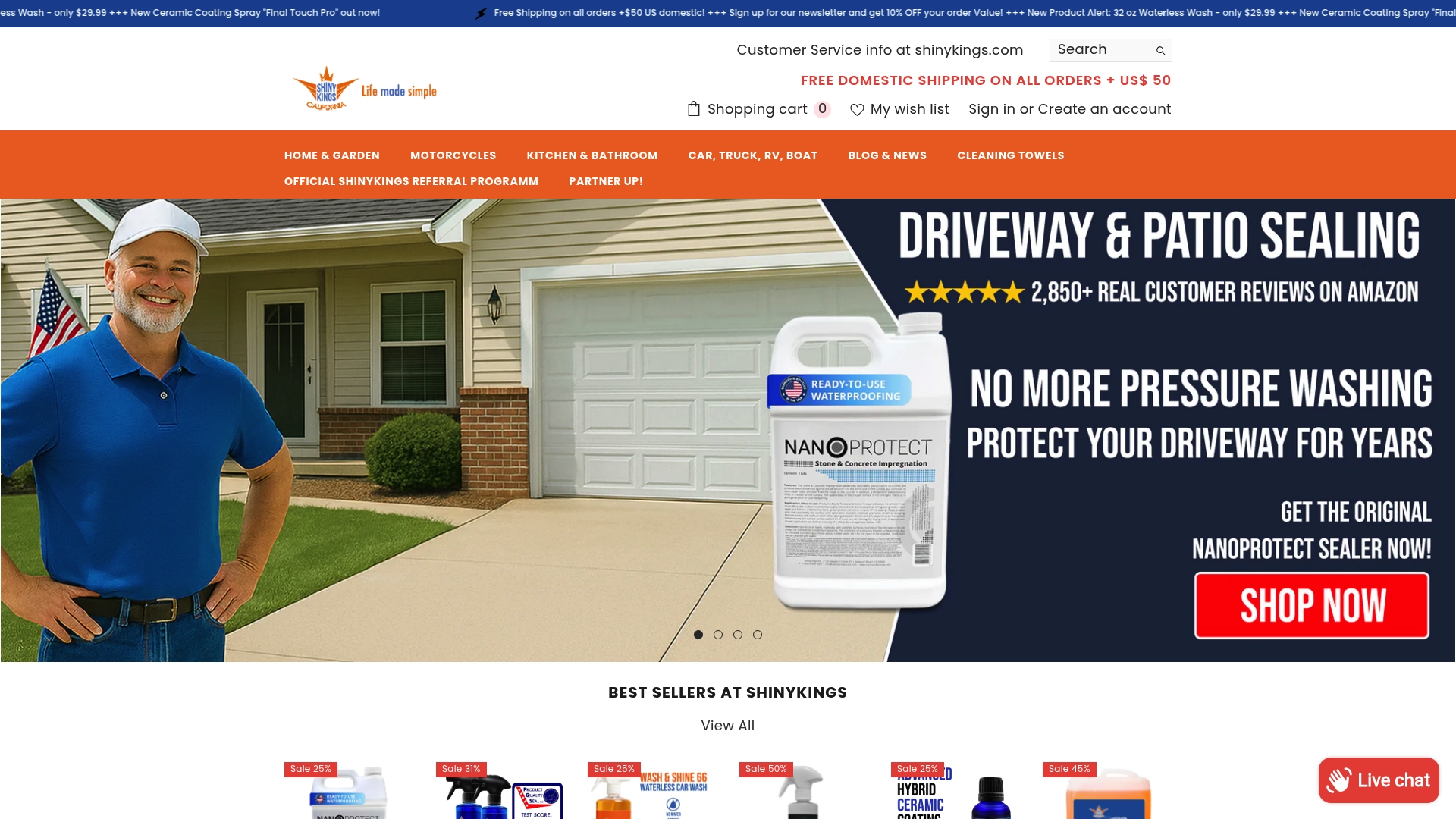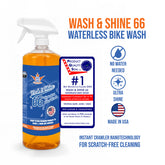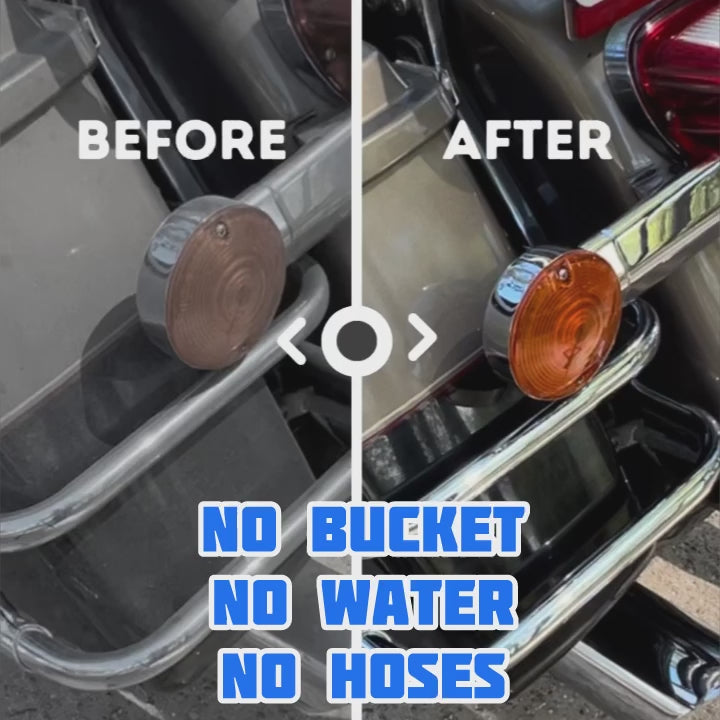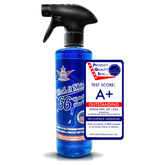What is Motorcycle Detailing? Understanding Its Importance
Motorcycle detailing sounds like simple cleaning at first glance, but it is actually a much more meticulous process that does far more than just make your bike shine. Think about this. Professional motorcycle detailing can help spot mechanical problems early and protect your investment from costly damage. Most people just run water over their bikes and call it a day, not realizing that skipping real detailing can lead to hidden wear, reduced performance, and lower resale value. There is a lot more riding on this kind of care than you might expect.
Table of Contents
- Defining Motorcycle Detailing: Key Concepts And Terms
- The Importance Of Motorcycle Detailing: Why It Matters
- Components Of Motorcycle Detailing: What Does It Involve?
- The Benefits Of Regular Motorcycle Detailing For Owners
- Understanding The Differences: Motorcycle Vs. Car Detailing
Quick Summary
| Takeaway | Explanation |
|---|---|
| Motorcycle detailing prevents damage. | Regular detailing protects motorcycles from environmental harm and mechanical deterioration. |
| Use specialized products for different materials. | Tailor cleaning and protection methods to specific components, such as paint, chrome, and leather. |
| Detailing enhances performance and safety. | Thorough inspections during detailing help identify potential mechanical issues, ensuring reliable and safe rides. |
| Regular maintenance preserves resale value. | Consistent detailing minimizes depreciation and increases the motorcycle’s market value over time. |
| Invest time in thorough cleaning routines. | Comprehensive detailing transforms standard cleaning into a valuable maintenance practice for long-term vehicle care. |
Defining Motorcycle Detailing: Key Concepts and Terms
Motorcycle detailing is a comprehensive process that transforms a standard cleaning routine into a meticulous art form focused on preserving and enhancing a motorcycle’s appearance and condition. Our guide on motorcycle maintenance provides deeper insights into this specialized practice.
The Core Definition of Motorcycle Detailing
At its essence, motorcycle detailing is far more than a simple wash. It represents a systematic approach to cleaning, restoration, and protection that goes beyond surface-level appearance. Professional detailers understand that each motorcycle component requires specialized treatment, from delicate chrome surfaces to intricate engine parts.
Detailing encompasses several critical elements:
- Thorough Cleaning: Removing dirt, grime, and contaminants from every accessible surface
- Surface Restoration: Addressing minor imperfections like oxidation, light scratches, and paint swirls
- Protective Treatment: Applying specialized coatings and sealants to preserve the motorcycle’s finish
Techniques and Professional Approach
Professional motorcycle detailing involves using advanced techniques and high-quality products tailored to specific materials. According to research from the Society of Automotive Engineers, proper detailing requires understanding the unique composition of different motorcycle surfaces.
Detailers typically employ multiple specialized tools and techniques, including:
- Microfiber towels for scratch-free cleaning
- Clay bars for removing embedded contaminants
- Precision polishing compounds
- Ceramic and graphene coating applications
The ultimate goal of motorcycle detailing transcends aesthetic improvement. It serves as a preventative maintenance strategy that protects the motorcycle from environmental damage, preserves its value, and extends its overall longevity. By investing time and expertise in detailed cleaning and protection, motorcycle owners can maintain their vehicles in pristine condition, ensuring both visual appeal and functional performance.
The Importance of Motorcycle Detailing: Why It Matters
Motorcycle detailing represents a critical investment in vehicle preservation and performance, extending far beyond aesthetic considerations. Learn more about maintaining your motorcycle’s shine to understand its comprehensive benefits.
Protecting Your Investment
Motorcycles are sophisticated machines representing significant financial investments that require meticulous care. Regular detailing acts as a proactive maintenance strategy that prevents long-term damage and depreciation. Environmental factors like road salt, UV radiation, industrial fallout, and moisture can gradually degrade a motorcycle’s critical components, potentially reducing its market value and operational integrity.
Key protective benefits include:
- Preventing metal corrosion and oxidation
- Preserving paint and finish quality
- Identifying potential mechanical issues during detailed cleaning
- Maintaining structural integrity of components
Performance and Safety Implications
According to research from the National Highway Traffic Safety Administration, proper maintenance directly correlates with vehicle reliability and rider safety. Motorcycle detailing provides an opportunity to conduct thorough visual inspections, enabling riders to detect potential mechanical vulnerabilities before they escalate into serious problems.
Detailing helps riders:
- Identify emerging mechanical wear
- Check critical system connections
- Evaluate tire and brake conditions
- Ensure optimal lubrication of moving parts
Long-Term Economic Advantages
Motorcycle enthusiasts recognize that consistent detailing represents a strategic financial decision. By investing time and resources in comprehensive cleaning and protection, riders can significantly extend their motorcycle’s operational lifespan. Professional-grade detailing minimizes the need for expensive repairs, preserves resale value, and ensures the motorcycle remains in peak condition.
The cumulative benefits of systematic motorcycle detailing transform what might seem like a cosmetic process into a critical maintenance protocol that safeguards both the motorcycle’s performance and the rider’s long-term investment.
Components of Motorcycle Detailing: What Does It Involve?
Motorcycle detailing is a comprehensive process that addresses multiple surfaces and components with specialized techniques. Our quick detailer guide provides additional context for understanding these intricate processes.
Surface Preparation and Cleaning
Surface preparation represents the foundational stage of motorcycle detailing, involving methodical cleaning and decontamination. Professional detailers recognize that different motorcycle surfaces require unique treatment approaches, demanding precision and specialized products.
Key surface preparation stages include:
- Removing loose dirt and debris
- Degreasing mechanical components
- Eliminating chemical contaminants
- Preparing surfaces for subsequent treatment
Specialized Treatment of Different Materials
According to research from the Society of Automotive Engineers, motorcycle detailing involves understanding the distinct characteristics of various materials. Each component demands a tailored approach to cleaning and protection:
- Paint Surfaces: Require gentle washing, clay bar treatment, and precision polishing
- Chrome Components: Need specific metal-safe cleaning agents
- Leather Parts: Demand specialized conditioning to prevent cracking
- Plastic Surfaces: Require non-abrasive cleaning techniques
Advanced Protection and Finishing Techniques
The final stage of motorcycle detailing focuses on long-term preservation through advanced protection methods. Professional detailers apply specialized coatings that create barriers against environmental damage, ensuring the motorcycle maintains its aesthetic and functional integrity.
Protective techniques encompass:
- Ceramic coating applications
- Graphene protective layers
- Sealant treatments
- UV protective applications
By comprehensively addressing each motorcycle component with targeted techniques, detailing transforms routine maintenance into a sophisticated preservation strategy that extends the vehicle’s longevity and maintains its pristine condition.
To help clarify the distinct stages and tasks involved in motorcycle detailing, the following table breaks down the main components and their specific functions.
| Component | Purpose | Key Tasks |
|---|---|---|
| Surface Preparation and Cleaning | Remove dirt and contaminants | Washing, degreasing, decontaminating |
| Specialized Treatment of Different Materials | Address needs of various materials | Paint polishing, chrome cleaning, leather conditioning |
| Advanced Protection and Finishing Techniques | Provide long-term protection | Ceramic or graphene coating, sealants, UV protection |
| Visual and Mechanical Inspection | Identify mechanical vulnerabilities | Checking connections, tire/brake inspection, lubrication |
| Restoration | Correct surface imperfections | Removing oxidation, scratches, swirls |
The Benefits of Regular Motorcycle Detailing for Owners
Motorcycle detailing transcends simple aesthetic maintenance, offering profound advantages for riders committed to preserving their vehicle’s performance and value. Check out our waterless motorcycle cleaner to understand how professional-grade products can revolutionize your maintenance routine.
Enhanced Vehicle Performance and Longevity
Regular detailing directly impacts a motorcycle’s operational efficiency by addressing potential mechanical vulnerabilities before they escalate. Professional-level cleaning removes corrosive substances, lubricates critical components, and allows for comprehensive visual inspections that can prevent future mechanical failures.
Key performance benefits include:
- Preventing premature wear on mechanical parts
- Reducing friction in moving components
- Identifying potential mechanical issues early
- Maintaining optimal engine and transmission performance
Financial and Resale Value Preservation
According to research from the National Highway Traffic Safety Administration, consistent maintenance significantly influences a motorcycle’s long-term market value. Detailing serves as a strategic investment that directly impacts the motorcycle’s aesthetic appeal and mechanical integrity.
Financial advantages encompass:
- Minimizing depreciation
- Reducing potential repair costs
- Maintaining higher resale market value
- Demonstrating meticulous ownership documentation
Safety and Psychological Benefits
Beyond mechanical advantages, regular motorcycle detailing provides substantial psychological and safety benefits for riders. Detailed motorcycles promote increased rider confidence by ensuring all components are clean, properly lubricated, and functioning optimally.
Psychological and safety benefits include:
- Enhanced visual inspection of critical safety components
- Improved rider confidence in vehicle reliability
- Reduced stress about potential mechanical failures
- Greater connection and pride in motorcycle ownership
By integrating systematic detailing into motorcycle maintenance, owners transform routine cleaning into a comprehensive preservation strategy that safeguards both their financial investment and riding experience.

Understanding the Differences: Motorcycle vs. Car Detailing
While motorcycle and car detailing share fundamental principles of cleaning and preservation, they diverge significantly in technique, complexity, and approach. Our guide on motorcycle cleaning techniques offers deeper insights into the unique nuances of motorcycle maintenance.
Structural and Surface Complexity
Motorcycles present unique detailing challenges due to their exposed and intricate mechanical components. Unlike cars with enclosed structures, motorcycles require more precision and specialized treatment for their multiple exposed surfaces.
Key structural differences include:
- Motorcycles have more directly exposed mechanical parts
- Fewer protective panels and coverings
- Greater vulnerability to environmental contaminants
- More complex surface interactions with road debris
Specialized Cleaning Techniques
According to research from the Society of Automotive Engineers, motorcycle detailing demands more nuanced and targeted cleaning approaches compared to automotive detailing. Each motorcycle component requires individualized treatment.
Unique motorcycle detailing techniques involve:
- Precision cleaning of engine and transmission areas
- Specialized treatments for chrome and metal surfaces
- Delicate handling of electrical components
- Intricate leather and fabric component maintenance
Equipment and Product Specificity
Motorcycle detailing requires more specialized and focused equipment compared to car detailing. Professional motorcycle detailers utilize precision tools designed to navigate complex mechanical configurations and delicate surfaces.
Detailing equipment differences include:
- Smaller, more targeted cleaning tools
- Specific brushes for hard-to-reach areas
- Motorcycle-specific chemical treatments
- Precision applicators for protective coatings
By recognizing these fundamental differences, motorcycle owners can develop more effective and tailored maintenance strategies that preserve their vehicle’s performance, aesthetic appeal, and long-term value.
The table below compares the unique differences between motorcycle and car detailing, highlighting why motorcycles require a more specialized approach.
| Factor | Motorcycle Detailing | Car Detailing |
|---|---|---|
| Structural Complexity | Exposed, intricate mechanical components | Enclosed, more uniform panels |
| Surface Accessibility | More direct access, fewer protective covers | Surfaces protected by panels and doors |
| Cleaning Techniques | Precision tools, material-specific products | Broader brushes, more general chemical use |
| Material Focus | Chrome, leather, plastics, engine metals | Paint, plastic, glass, fabric |
| Equipment Specificity | Specialized, small-detail applicators | General-purpose applicators and polishers |

Take Your Motorcycle Detailing to a Professional Level
You care about protecting your motorcycle from wear, corrosion, and diminished shine. Every detail counts whether you want to preserve its value or keep it looking new. The challenges you face—like finding the right cleaners or ensuring long-lasting protection—are exactly what the article highlighted. Now, imagine a solution made specifically for these needs. Explore our complete range of Motorcycle Cleaners & Coatings for Every Ride to discover industry-leading formulas designed to elevate your detailing routine.

Don’t settle for basic cleaning that leaves your investment exposed. Choose Best motorcycle cleaner and Graphene Ultra coating to protect every surface and maintain that pristine finish. Visit shinykings.com now. Invest in quality products and let your motorcycle stand out for years to come.
Frequently Asked Questions
What is motorcycle detailing?
Motorcycle detailing is a thorough cleaning, restoration, and protection process that enhances a motorcycle’s appearance and preserves its condition. It involves specialized techniques tailored to different materials and components.
Why is motorcycle detailing important?
Motorcycle detailing protects your investment by preventing corrosion, identifying mechanical issues early, and maintaining aesthetic appeal. This proactive strategy enhances performance, safety, and the motorcycle’s resale value.
What techniques are used in motorcycle detailing?
Techniques include thorough cleaning, surface restoration, and protective treatments like ceramic coatings. Detailers use specialized tools such as microfiber towels, clay bars, and precision polishing compounds for effective results.
How does motorcycle detailing differ from car detailing?
Motorcycle detailing is more complex due to exposed mechanical parts and unique surface treatments. It requires precise cleaning techniques and specialized products tailored specifically for the distinct characteristics of motorcycle materials.
Recommended
- Best Way to Clean Motorcycle for a Sparkling Finish – shinykingsinc
- The best Essential Tips for Maintaining Your Motorcycle’s Shine – shinykingsinc
- What is Quick Detailer: Understanding Its Essentials – shinykingsinc
- 1.32 GAL (169) fl oz Wash&Shine 66 Waterless Motorcycle Cleaner - Oran – shinykingsinc




